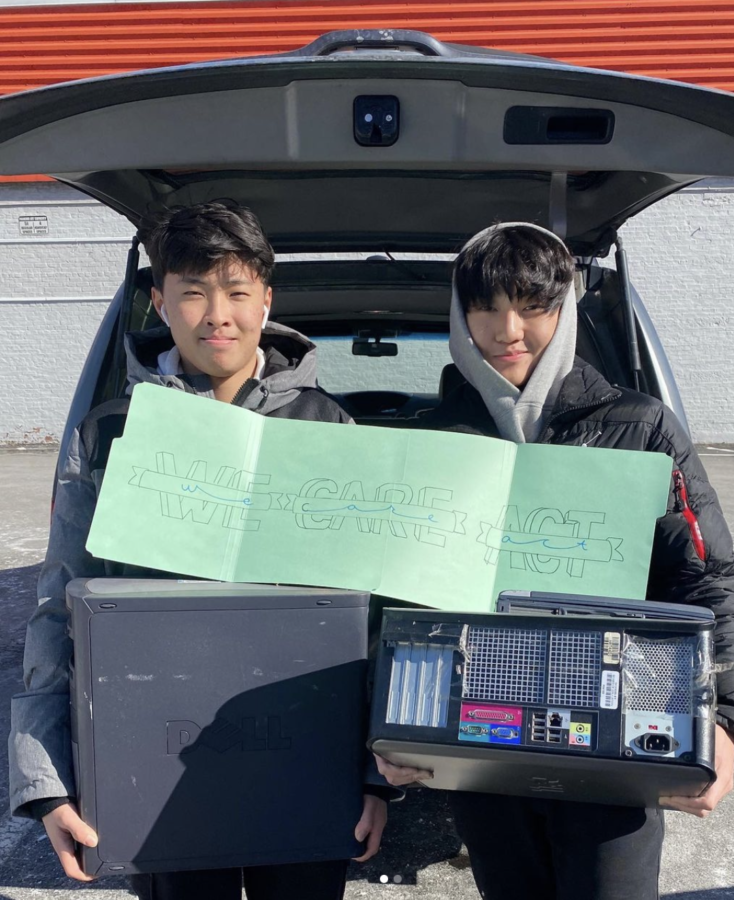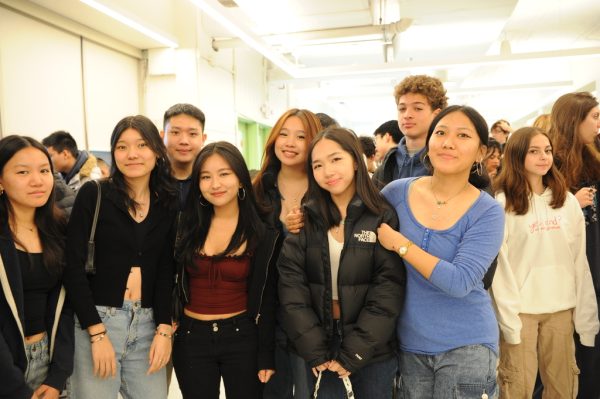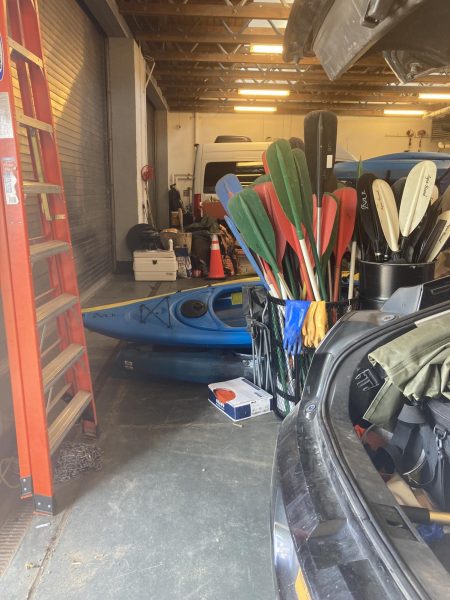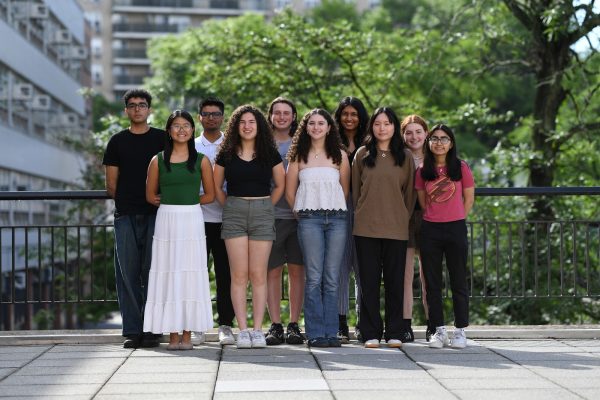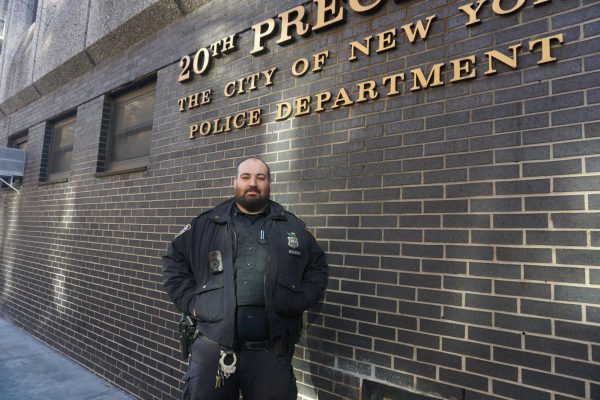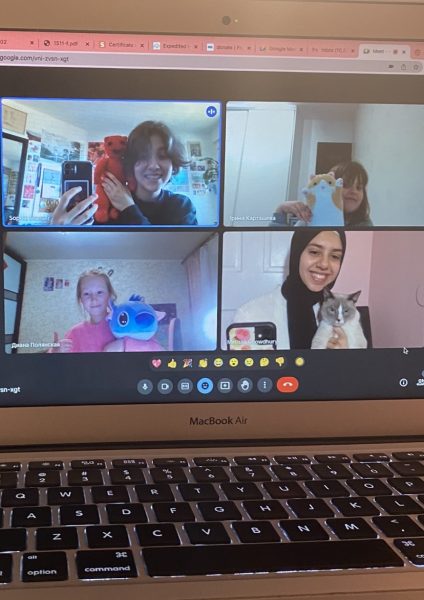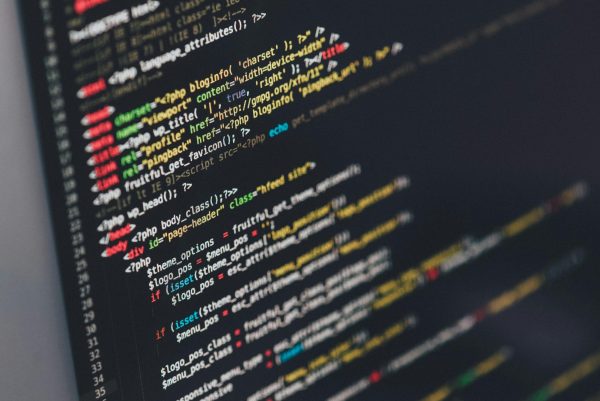We Care Act: Bronx Science Students Give Back to Underserved Communities Within New York City
A small student-led nonprofit organization that has raised over $50,000 dollars to donate technology to underprivileged students shows just how boundless student entrepreneurship is.
Here are We Care Act NYC Co-heads Jeffrey Yang ’23 and William Kim ‘23 after a successful recycling mission.
As technology advances, so do our schools. Increasingly, schools and educators are embracing technology in their teaching. This was further accelerated by the COVID-19 pandemic. Yet, a question remains unanswered: Are all students able to keep up? Specifically, can they afford to do so?
According to a survey conducted by the New York State Education Department, 125,710 students, or 14% of all students in New York City, did not have access to a dedicated computing device during the 2020-2021 school year, the same year that schools were forced to switch to remote learning. This is in addition to the nearly 500,000 kids who were provided a dedicated device from their school or district.
Jeffrey Yang ’23 said, “While we were doing remote learning, I saw a handful of kids in my zoom classes who had to use school laptops because they didn’t have their own.”
Troubled by these inequities, he decided to do something about the issue.
In November of 2022, during his junior year at Bronx Science, Jeffrey decided to start a nonprofit organization called We Care Act NYC (WCA) along with four of his friends: William Kim ’23, Benjamin Chong ’23, Eric Mann ’23, and Aaron Tang ’23.
We Care Act NYC is an environmentally conscious nonprofit organization that focuses on providing technology to students who need them. They receive laptops from donations and then refurbish them before giving them out to students who request them through an application on their website. On top of that, they host park pickups and recycle used technology parts in the laptops they hand out. The organization also hosts workshops where they teach attendees the basics of computer hardware, software, and computer hygiene so that they can learn to repair technology for a better future.
I interviewed cofounders Jeffrey Yang and Aaron Tang about their organization.
How did your background impact your decision to start WCA in NYC?
Jeffrey Yang: Growing up in the poorer parts of the Bronx and then moving to Queens, I witnessed firsthand the disparities within different communities. As more of our world becomes digitized, owning a laptop is becoming a necessity. I consider myself very lucky to be able to attend a school like Bronx Science, where we have access to technology. But schools in underserved communities don’t have the same access, hindering the potential of their students. Armed with the determination to empower and provide equity to the youths within these underserved districts, I reached out to WCA Houston to get their permission to start a branch in NYC, and then officially founded the branch alongside Aaron Tang, Will Kim, and Eric Mann.
Do you have a personal connection to WCA?
Jeffrey Yang: I was a part of the original WCA since I was around 9 or 10. Sharon, Grace, and Eric Huang started WCA (not WCA NYC) in Houston. Their mother was a family friend, so they would ask my mother and me to help out from time to time. One of their ongoing projects at the time was “Life Initiative for Technology” (LIFT), dedicated to recycling and refurbishing used electronics. We did what we could from New York, scheduling pick-ups and driving around the neighborhood to collect old desktops and laptops. I remember storing 3 or 4 in my house’s garage, where I would replace the hard drives and install new RAM. Then we would ship them off to Houston, where WCA would donate them to refugee centers across the world. I attribute these moments to my budding interest in technology and building computers.
Why the We Care Act? Who or what gave you the idea to branch the nonprofit in New York?
Jeffrey Yang: We Care Act already had their ongoing Life Initiative for Technology project, which aligned with our goals. We decided to branch the nonprofit to move a bit more freely. Of course, we received advice from the original founders of the We Care Act, as they had started from nothing, but Aaron, Will, Eric and I wanted to bring about change ourselves. I think this whole process was a really great learning experience for the four of us as well; we faced many challenges and came out as better leaders with a better understanding of how to build and market a business.
What were the goals when starting the organization and have they changed?
Aaron Tang: Somewhere throughout the year, we leaned a little more toward the community service aspect of our strategy and tried to promote leadership and student autonomy, but I think we just realized it wouldn’t be feasible at that time with the number of resources we had. Our major turning point just hit us after I had been speaking to an e-waste management company for a while earlier this year, and we finalized a partnership with them where they would donate used technology to us and we would refurbish and donate them to students in need. After that, I just saw this alignment of solutions for mitigating e-waste and educational barriers and we’ve focused on chiseling our business model to perfection ever since.
Are there any other organizations that do the same work? What makes you different?
Aaron Tang: There are a few organizations that do this in New York City, the most prominent being the non-profits GlobeTops, Laptops For Kids, and Computers With Causes. I’m not sure if most of them are still active, since some seemed like more COVID-19 response projects, though. I would say our business model itself differentiates us already in this unconcentrated market, we haven’t been facing any competition in regards to gaining traction with companies and receiving donations. Our website is also ranked pretty high on Google search results, so I don’t think it’s been so much our ability to differentiate ourselves from existing organizations as it has been our ability to build credible relationships as a high-school team.
Do you plan to continue the We Care Act in college?
Jeffrey Yang: Although all of the senior staff will be going to different colleges next year, I plan on continuing We Care Act NYC, along with the executive board, throughout college. The way we intend to do so is still being decided. As of now, we have recruited some underclassmen to continue the We Care Act presence within Bronx Science. I plan to mentor them as the original founders of We Care Act mentored us, producing the future generation of leaders who are passionate about giving back to New York City.
Regarding events, are there more planned? Will they continue to have a focus on the environment or will they be more technology-based?
Aaron Tang: We have events planned for the future that are both environment-based and technology-based. In early 2023, we plan to host e-waste drives in collaboration with our sponsors, where people can drop off their used electronics to be recycled. We also need to refurbish the computers we currently have in order for them to be donated, so events will be held for this as well.
What are the numbers? How much have you raised so far? And what are your projections for next year?
Aaron Tang: I think we’ve neglected our revenue streams for a while since our model primarily revolves around physical donations, so we don’t really keep records or projections of our “earnings” as a non-profit organization. I can say we’ve raised around sixty thousand dollars so far, at least in terms of market value for second-hand computers. If I were to make an estimate, I believe the next year would yield something similar if not a dozen thousand more worth of computers, considering the amount of traction we’ve gained from companies and prospective clients.
What partnerships are going on at the moment? Are there any future partnerships you are seeking?
Jeffrey Yang: Currently, we are partnered with 4THBIN, Project Rousseau, and the Spuyten Duyvil Library. We are always on the lookout to partner with more organizations across New York City.
How many members does WCA have?
Aaron Tang: Something we’ve been struggling with is our member models since we’ve wanted to maintain the community service tenet of our organization from our parent branch as well. We partner with Key Club, but our own members comprise almost entirely of just staff. There are currently around 40 staff members spread across a couple of departments of interest, including marketing, operations, journalism, outreach, human resources, and information technology.
What are the roles of members of the team? Do they contribute outside of the meetings and events?
Aaron Tang: A core belief we’ve instilled in our organization is the importance of idea flexibility and execution. Our staff has varying responsibilities contingent upon their respective departments but generally, the biggest contributions they make are from their own ideas. Whether it is pursuing an article on e-waste or education in journalism or reforming our social media presence in marketing, we really want everything to be a trial-by-fire process where members can pursue whatever projects and topics they’re interested in. We promote autonomy and allow members to appreciate the creative process just as much as they are consumed in the execution of their own ideas, making this organization their own as well.
******
We Care Act’s numbers and, most importantly, their diligence is definitely impressive. In a short time span of only two years, they have grown from a small organization consisting of five kids to dozens of members dedicated to fighting tech inequities. The organization’s decision to address this issue by recycling and refurbishing used parts rather than just purchasing new technology works to fix both inequality in access to technology and the growing amount of e-waste in our environment. Even though the lack of technology for certain students still persists in New York City, one thing is for sure — those in We Care Act NYC truly do care.
To find out more about We Care Act NYC, visit https://wecareactnyc.org
“Growing up in the poorer parts of the Bronx and then moving to Queens, I witnessed firsthand the disparities within different communities,” said Jeffrey Yang ’23.
How Yat (Osmond) Chung is a News Editor and an Instagram Editor for ‘The Science Survey.' Osmond enjoys journalistic writing because it grants an audience...

